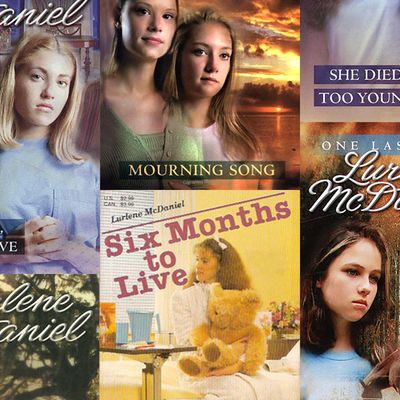
The Fault in Our Stars has become something of a phenomenon, a staggeringly popular YA book that has spawned a high-profile movie (out this weekend) and somehow created a nation where young people are now familiar with the word cannula. And infinity mazel tovs to everyone involved: It’s a good book, and a good movie (I hear), and we all like a good cry now and then. But let’s not act like TFIOS invented teen cancer books. Teen-with-cancer YA books have been around for a long time — and as a tween, I was obsessed with them. This is not to knock TFIOS in any way, but merely to acknowledge that it is part of an expansive tradition of terminally ill-teenager YA novels. There are a ton of these books, and I read them all. Or just about.
I must have read 100 dying-teen books. Most of them were about characters with cancer, but there were a few cystic fibrosis sagas in there, maybe an early HIV/AIDS story (we’re talking the early ‘90s here), some catastrophic accidents, and some generalized organ failure. I can still picture the exact spot at the library where these books were shelved, and the only reason I stopped reading them was that I exhausted my library’s — and my school library’s — supply. This is why I read many of these books multiple times. I tried to scratch the same itch with Deenie and her scoliosis, but it just wasn’t severe enough. I needed the real deal!
The longtime queen of the dying-teen book is Lurlene McDaniel, who has written dozens of novels in the genre. I was partial to Mother, Help Me Live, in which a leukemia-stricken Sarah discovers that she’s adopted — and thus cannot get a bone-marrow transplant from anyone in her family. Her biological mom turns out to be a real pain, too, so it’s fraught on several levels. I was really into McDaniel’s Dawn Rochelle series, Six Months to Live, I Want to Live/So Much to Live For, and No Time to Cry — those are about two girls who both have cancer and go to cancer camp together and stuff, but then one of them dies. I tried mightily to incorporate some of the summer-camp rituals from the cancer camp in the book into my regular YMCA camp, but no one ever went for it. In the book, campers keep small boxes of the campfire ashes from the previous summer and bring them back to camp the next year. I maintain that this is a perfectly lovely tradition.
I read A Time to Die, about a teen with cystic fibrosis, over and over, and to this day remember exactly which Bible verse was on our heroine Kara’s headstone. (“And God will wipe away every tear.”) I learned about survivor guilt from Somewhere Between Life and Death and Time to Let Go, in which Erin dies but her sister Amy survives. You know, guiltily. Someone Dies, Someone Lives was about a track star who needs a heart transplant; I liked that one, too, and some of the other organ-donation ones, though I was more intrigued by heart, lung, and heart-and-lung transplants than by kidney transplants. The books about diabetics were, at best, a last resort.
I have no explanation for the origins of my obsession; no one in my family had cancer, I was not working through any kind of childhood trauma, nor was I particularly fixated on death or sadness in general in the rest of my life. I wasn’t only reading cancer books, either. I liked gymnastics books and World War II books, too and anything by Madeline L’Engle. Given my first name, I of course have a long history with Judy Blume books, though I preferred It’s Not the End of the World to Are You There God, It’s Me, Margaret. I was fascinated by the misery and abuse in They Cage the Animals at Night, Goodnight Mr. Tom, and One Child, constantly enraged by the injustices in the Roll of Thunder, Hear My Cry series (Road to Memphis fans, I know you’re out there!), and empowered by wilderness survival stories like Hatchet and Julie of the Wolves. I liked Laurence Yep books a lot. But for some reason I was really drawn to these cancer stories, even though as I was reading them, I often thought hmmm, this is not a very good book. It was safe to test out those Big Feelings of fear and grief and loss in the context of a just-okay book, and test them out I did. I wept over these books — hell, I got a little choked up a few minutes ago typing out the part about God wiping away every tear — and raged with grief over the unfairness of it all, even reading the books three and four times over. I get why people lose their minds crying over The Fault in Our Stars. I’ve done it before. A lot.

